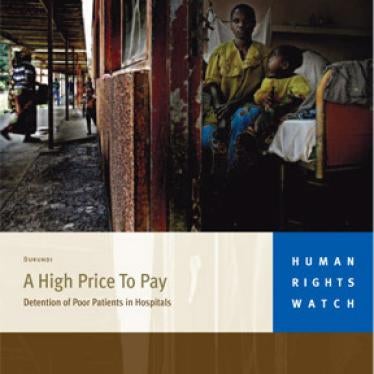Burundian state hospitals routinely detain patients who are unable to pay their hospital bills, Human Rights Watch and the Burundian Association for the Protection of Human Rights and Detained Persons said in a new report released today. The patients can be detained for weeks or even months in abysmal conditions.
This practice highlights broader problems of the health system in Burundi, where patients have to pay for their own treatment, the two organizations said. Both organizations called on the Burundian government to end the detentions and to make access to health care for all Burundians a central part of its new Poverty Reduction Strategy Paper.
“Detaining poor patients because they can’t pay a bill punishes the poor and violates international human rights law,” said Juliane Kippenberg, NGO Liaison of the Africa division of Human Rights Watch. “It’s an abuse that the Burundian authorities must end.”
The 75-page report, “A High Price To Pay: The Detention of Poor Patients in Hospitals,” documents how Burundian hospitals in 2005 detained hundreds of indigent patients, sometimes in inhumane conditions. Many of those detained were women giving birth who unexpectedly needed caesarian deliveries. In some cases, hospital authorities refused further medical care to those who could not pay their bills and forced them to vacate their beds for wealthier incoming patients.
Patients who could not pay their bills were kept under guard and prohibited from leaving the hospital grounds, often for weeks or months, but in one case for more than a year. Some detainees sold their farm animals or land to settle accounts in order to leave hospitals. Others escaped or were rescued by benefactors who paid their bills. Burundi’s government continues to detain indigent patients and hundreds are currently in detention in the country’s state hospitals.
In Burundi, one of the world’s poorest nations, patients commonly have little money to pay medical expenses. The most vulnerable are supposed to have part of their medical expenses paid by the government, but the system of assistance does not work in practice. Moreover, the Burundian health sector is plagued by massive funding shortfalls and by fraud and corruption.
“With authorities working on poverty-reduction strategies, it is clearly past time for them to address the basic right of all Burundians to health care,” said Jean-Baptiste Sahokwasama of APRODH.
On May 1, 2006, the government took a positive step of ordering that maternal and child health care be provided free of charge. Hospitals have since allowed mothers and small children to leave hospitals without paying their bills. However, the measure was ill-prepared for and resulted in an influx of pregnant women and sick children, severely straining hospital resources. The measure did not provide relief for other indigent patients who continue to be detained.
“Donors will soon be making major decisions about debt relief and aid to Burundi,” said Sahokwasama. “Funds from debt relief and international assistance should be urgently directed toward health care so hospitals and doctors can focus on providing health care to all those in need.”
Field research for this report was carried out in six Burundian hospitals between January and June 2005. The report is based on interviews with more than 40 detained patients, in addition to health care providers and government officials.
Testimonies
We arrived in Gitega hospital on June 15, 2004. At that moment I had nothing because the rebels had come to my house and looted almost everything. I was operated [on] here, but there was no improvement. Three months ago, they came to see me and told me to pay … 1,750,000 FBU [$1,750]. I don’t see how I can pay this bill, because I do not even have a plot of land that I can sell.
– David S., a 32-year-old farmer held at Gitega Hospital following a car accident.
I had to come to hospital because I needed a caesarean delivery. When I got the bill, the doctor said to me, “Since you have not paid, we will keep you here.” Life here is difficult. I don’t have permission to leave with my baby. We are often hungry here. I cannot stand this situation any longer.
– Christine K., an 18-year-old woman detained with her baby at Louis Rwagasore Clinic, Bujumbura.
I had a car accident; it was a U.N. car. I was playing with other kids and they pushed me onto the street. My leg was destroyed ... I was in seventh grade in school, but now I am not going to school any more. Now I am healed; there is just one small injury left. My family cannot pay the bill. I have been told that I cannot leave unless the bill is paid. I am detained here because I cannot go past the exit. The nuns give me food twice a day.
– Félix M., a 12-year-old boy held for over a year at Prince Régent Charles Hospital, Bujumbura; his father used up funds given to him for the hospital bill.
I am detained because I cannot gather the money to pay the bill. I cannot leave or move around. I am watched everywhere because they always think I want to escape. But it is not good to run away. When they catch you, you cannot go back for treatment. I would be punished for that.
– Félicité G., 17-year-old mother of a baby suffering from malaria, detained at Ngozi Hospital.







